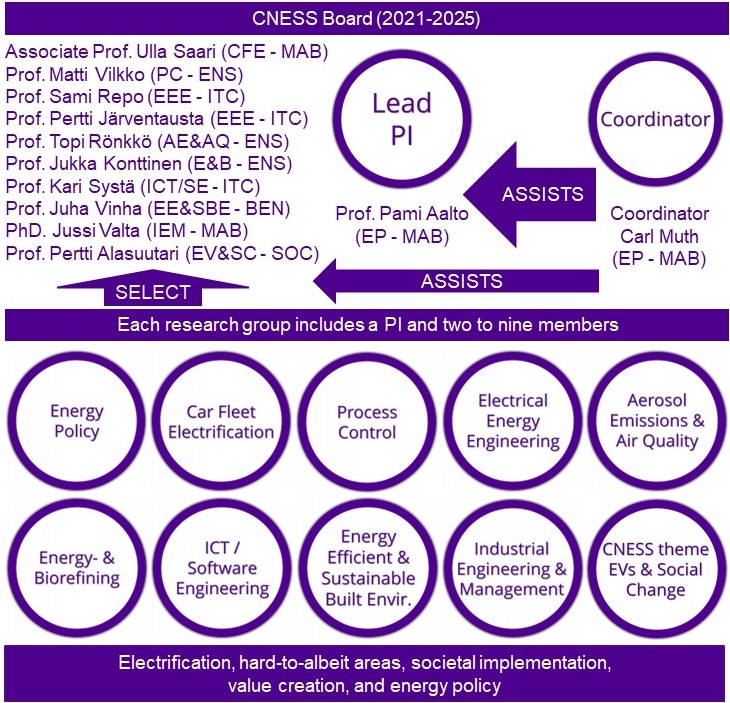
CNESS
The Climate Neutral Energy Systems and Society (CNESS) research platform addresses the challenges of climate change from several novel perspectives focusing on energy systems and society. CNESS combines Tampere University’s existing and emerging potential and expertise in several engineering, natural science and social science and business disciplines, focusing on six closely interrelated areas: electrification of energy systems, hard-to-electrify areas, societal implications of the energy transition, value creation and energy transition, energy policy and energy efficient and sustainable built environment. This interdisciplinary character allows CNESS to contribute particularly to areas where monodisciplinary competencies do not suffice to tackle the evolving climate and future energy-related challenges. To this end, CNESS also seeks to actively liaise with partners and stakeholders.

Five research areas:
Electrification of energy systems
CNESS approaches upcoming challenges from the perspective of electrification as the bulk of energy will increasingly consist of electricity from renewables and nuclear power. Moreover, wind and solar power produce weather-dependent, variable output, which is difficult-to-store electricity. Therefore, electrification of energy supply raises several interdisciplinary research questions regarding storage technologies, flexibility mechanisms in future electricity markets and extending to the international balance of power as many fossil fuel producers lose their former leverage. Furthermore, electrification will extend deep into the central energy end-use sectors, namely transport (electric vehicles or EVs), buildings and industry (electric heating and cooling, electrified processes). The demand for electricity and respective infrastructure also increases. The new flows of electricity linking power, transport, buildings and industry together provide a common interdisciplinary focus area for the platform that includes smart electricity grids, understanding of new ICT technologies, data management infrastructures, software-based management and new interactions among stakeholders.
Hard-to-electrify areas
The platform addresses questions on the control of emissions in heavy transport, maritime transport and aviation, where different gaseous and liquid biofuels are to be used for a long time, alongside solid biofuel use in district heating in biomass-rich countries such as Finland. While the bio-economy sector contributes to lower carbon emissions, it also enables new materials and products. The use of these resources raises several interdisciplinary issues not only on technological and infrastructural solutions, but also on the lock-ins, path-dependencies and creative destruction in the economy and society.
Societal implications of the energy transition
The societal implementation of the ongoing energy transition raises several questions requiring interdisciplinary study. This involves acceptability issues vis-à-vis the use of data on electricity consumption by EVs and households in the context of smart grids, automated management of energy consumption in buildings and the functioning of EV batteries as energy storage resources. CNESS focuses also on the engagement of citizens into prosumer roles for small-scale production and storage of renewably generated electricity, and overall, a whole new aesthetics of energy transition in life without oil.
Value creation and energy transition
At the interface of energy systems and technologies, in particular smart grids, and their taking into use in the society lies the area of value-creation. The interdisciplinary questions for CNESS concern for example consumer behaviour, data monetisation, business interests and ICT infrastructure.
.
Energy policy
Energy policy and political decision-making are central to accelerated electrification. Here the interdisciplinary questions concern for example the vested interests of several economic, social and political groups that can hamper the transition. At the same time, electrification can bring broader co-benefits not ‘only’ for climate, but also for the state’s security of energy supplies, energy efficiency, export prospects, and socio-economic implications of the energy sector including jobs and taxation income. Here, CNESS‘ interdisciplinary work can relate to policy diffusion from global to national energy policies and back and how these contestable issues are imagined and framed into institutional practices.
Goals
For CNESS, the transition to climate neutrality is not only about climate or energy. With this broad focus, the platform supports interdisciplinary work while it also values renewal of researcher community and outreach, as evident in the platform’s goals:
- To establish electrification as a globally visible key area in the study of energy systems, including transport, built environment and industry
- To enable and support interdisciplinary combinations in these fields not much seen so far nationally or globally
- To establish a visible presence for collaboration and co-creation with stakeholders in the industry, the public sector and civil society
- To nurture new researcher generations, promote diversity in the field and to expose different researcher cohorts to interdisciplinary work
TUNIs research platform
CNESS is Tampere University’s own funded four-year term research structure that was established in 2021. The goal of the platforms is to promote national and international collaboration across disciplinary boundaries and with different stakeholders from the private, public and third sectors. Furthermore, the research hubs aim to contribute substantial input to debates and discussions in their fields of expertise both in Finland and beyond that deliver impact for society and address important societal questions.

